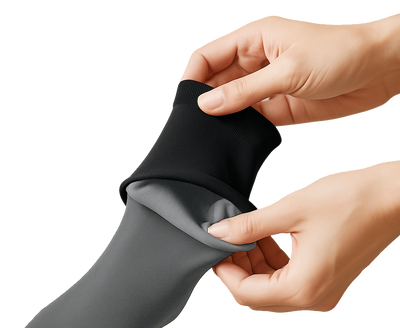Wellness and Sleep

Celebrate National Wellness Month with these Skineez® products that will help you get fit and trim! Each week Skineez® will publish an article with tips and info related to Health and Wellness.
This article is part 3 in our 3 part series for Wellness Month. This week we will be exploring Wellness and Sleep.
Sleep is an essential component of wellness.
Not getting enough sleep can have significant effects on your physical as well as mental health. Allowing yourself at least 7 hours of sleep reduces these risk factors dramatically.
Sleep is our body's way of renewing our body's cells and organs. Since skin is our largest organ, it makes sense to revitalize as we sleep. Skineez® Beauty Collection allows you to moisturize your skin while you sleep. Our micro-encapsulation fabrics slowly release skin-reparative moisturizers like Retinol, Shea Butter, and Rosehip Oil deep into your skin. This process thoroughly hydrates your skin instead of a topical lotion that only moisturizes the top epidermis layer of skin.
In a clinical study, 88% of women reported softer and smoother skin just by wearing Skineez® for 8 hours for just one day, which is about the time you need to sleep.

Health risks associated with lack of sleep
Reduce your risk of;
- High blood pressure-hypertension is when your blood pressure is over 140/90. If untreated, high blood pressure can lead to heart disease and stoke
- Type 2 diabetes-diabetes affects the way your body processes sugar. Type 2 is when your blood sugar levels are too high.
- Obesity-Obesity is when your BMI is 30 or higher. Lack of sleep creates a hormone imbalance that creates a feeling of hunger, leading to eating more than required.
- Depression-Lack of sleep reduces serotonin which regulates mood. Sleep and depression are interconnected. Lack of sleep causes depression, and depression causes lack of sleep. If you are predisposed to depression, be sure to allow enough time to sleep.
Five tips to get better sleep
- Get enough exercise during the day, but not too close to bedtime. According to Johns Hopkins, researchers don't fully understand how exercise affects sleep, but studies show that exercise increases deep restorative sleep.
- Avoid blue light from your computer and smartphone. Blue light is helpful during the day, but it affects the circadian rhythm, which regulates your sleep-wake cycle.
- Keep your bedroom cool and dark. If your bedroom is too warm or too cold, it can affect your sleep. Doctors recommend keeping your room at 68° F.
- Eat healthily. Stay away from foods high in sugar and fat. Junk food interferes with your body's ability to wind down before sleep. Sugar creates a quick spike in energy that drops quickly and is hard on your system.
- Don't watch TV in bed. Opt for quiet music with a slow tempo. Some people use television to block noise, but you are better using a white noise machine. Even better, listen to calming music before bed to help you fall asleep faster.



